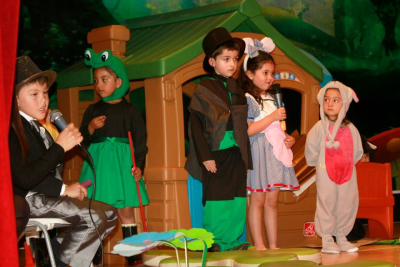
Theatre is one of the oldest forms of entertainment in the world. It had its beginnings in ancient Greece when the followers of the Greek god Dionysus started indulging in festivities to honour the god. It started off as a medium for the recollection of old myths. And over time, it has turned into a performing art that sees a lot of experimentation. Learning theatre can help a child in more ways than one. As we celebrate World Theatre Day on March 27, let us take a look at how theatre education can help a child.
It all started in the 6th Century. That was the time the Greek theatre had its genesis. Its origins can be traced to the followers of the Greek god Dionysus. The devotees or Dionysians would hold ceremonies for the god which would be filled with festivities. In these ceremonies, they would sing and dance in a choral form and narrate the stories from Greek myth. The art of theatre was just evolving.
Ancient Greek port Thespis was born in the city of Icarius. Regarded as the first actor in Greek drama, he was also the inventor of tragedy and the first to stage a tragedy at Dionysia. He gave a fresh spin to drama during a chorus when he stepped out and started reciting and performing portions of the text. Thus, he became the first actor. Now you know why actors are called thespians. It is in honour of the Greek performer Thespis. Soon a structured form of drama developed.
Performing arts
It is a widely accepted fact that kids who are involved in performing arts have an edge over others in several aspects. Be it music, dance, or acting, the performing arts not only make a child acquire enhanced cognitive, motor, and social skills but empower them to tackle most of the challenges that they may encounter later in life. It is also observed that they also achieve more academically. Getting onto that stage can help you in more ways than one. Let's read up on how involving oneself in theatre is beneficial.
A multidimensional art
Theatre is one art that encompasses a range of art forms, such as dance, music, literature, fine arts and so on. The creative, intellectual, and emotional aspects of a child get developed when they indulge in theatre. Theatre also builds a new community for the kids. It is more like an extended community where participants get to meet people of varied perspectives as well as from diverse backgrounds. This helps them make a wide circle of friends.
Quick thinkers
If you are in a play, then you learn to think on your feet. If you were to forget your lines, then you learn to improvise on the go. Moreover, the trick is to ensure that the audience does not know what went wrong. A number of challenges could arise that may disrupt the flow of a play. So you learn to keep your calm in the face of chaos. This makes one a quick thinker and enhances problem-solving skills.
Theatre is a blend of music, dance, acting, and delivering of lines of speech or monologue. Being part of a play lets one experience all forms of art as well as become more expressive. It helps them communicate better and introduces them to a whole new Vocabulary and ways of communicating. Skills such as articulation, vocal projection, and emotional expressions improve with theatre. Thus a child learns to communicate better and in unique ways.
Exposure to history, art, culture
Theatre offers an introduction to kids to art history, and new cultures. It gives them good exposure and helps them appreciate varied cultures and people of all kinds.
Self-esteem
Confidence is a life skill. When a child learns to articulate better on stage, face a crowd, and perform, it boosts their confidence. Theatre teaches a child to be assertive, speak up, be confident, and be comfortable in n crowd. Moreover, theatre gives instant positive feedback. When the crowd cheers you on laughs at your joke, or cries with you, it can be very rewarding.
Responsibility and teamwork
A group performance, theatre would need exceptional teamwork to succeed. The kids learn the need to work together as a team to put out a great show. They also understand personal responsibility, the need to know their lines and deliver them perfectly. They learn to be responsible not just for their own act but also for the team as they move towards a common goal.
In theatre, there is space for everyone. However different you may be from the norm or your peers, theatre accepts you for who you are You may be an eccentric or a recluse, but wherever you belong in the spectrum, you will always be accepted.
Emotional intelligence
As one grows up and strides through life, one understands that it is not just the intelligence quotient that matters, but emotional quotient too. Theatre is akin to empathy training. It helps you grow and transmute into any person you want to be when you play a character. Thus you also learn to walk in other person's shoes and experience life from their perspective. Further, a child with a theatre background grows into a person who is more inclusive, tolerant, and empathetic
In a nutshell, theatre gives you the platform to express yourself in the most colourful of ways. Are you ready for the first act?
Picture Credit : Google




